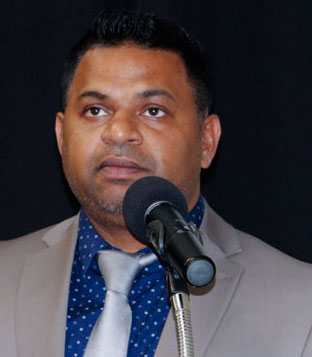President of the Georgetown Chamber of Commerce and Industry (GCCI), Deodat Indar on Wednesday used his address to the organization’s Annual General Meeting to set out the various ways in which he said the Chamber had been successful in exerting “significant influence” on public policy over the past year.
And while he identified “the removal of the controversial Value Added Tax (VAT) on education” as being foremost amongst the lobbying initiatives of the Chamber, Indar listed up to fourteen Chamber undertakings which he said had defined 2017.
Not least among these, according to the Chamber President were the GCCI’s “fierce advocacy for stimulus for the economic sectors that were seeing some form of decline”, its ongoing fight for the removal of the 2 am curfew on night businesses and for the removal of Value Added Taxes on timber products, pesticides, herbicides, fertilisers and water and electricity.
Meanwhile, Indar said that the Chamber had also played a lead role in the countrywide consultations on the Draft Petroleum Commission Bill as well as in the work done by the Ministry of Natural Resources on developing an oil and gas-related Local Content Policy for Guyana.
In setting out the Chamber’s broader business posture, Indar told the meeting that “using cooperation with a healthy dose of competition as a guiding philosophy, it is the Chamber’s position that strategic partnerships between local and foreign companies, as well as strengthening bilateral trade relations, will bode well for the promotion of private sector development in Guyana.” And the Chamber President disclosed that in pursuit of this goal the Chamber has already embarked on strategic partnerships with foreign private sector institutions.
The Chamber, according to Indar, had embarked on the adoption of Memoranda of Understanding between itself and the Newfoundland and Labrador Environmental Industry Association (NEIA) of Canada, the Federation of Indian Export Organizations (FIEO) of India and the Chamber of Commerce of the Republic of Cuba. These MOU’s, according to the Chamber President, will be executed “through multi-stakeholder Trade Facilitation Councils which will be responsible for all activities designed to, among other things, promote strategic partnerships through joint, improve bilateral trade, arrange Business to Business meetings (B2B), promote trade missions etc.”
The Chamber wants these initiatives to serve as a “catalyst to private sector growth and, by extension, economic growth by structuring trade, facilitating technology and skills transfer, as well as allowing access to new markets,” Indar says.
Meanwhile, discomfiting interludes in relations between government and the private sector had not daunted the Chamber from treating meetings with government agencies as one of the strategies designed to create a more conducive business climate and in order to make it easier to do business in Guyana, Indar told the Chamber AGM. This past year, he says, the Business Support Organization had engaged various state agencies including the Guyana Revenue Authority (GRA), the Ministry of Public Infrastructure, the Ministry of Finance, the Ministry of Public Health, and the Ministry of Natural Resources. Additionally, the Chamber President said that the body has been able to create what he described as “Dialogue Committees” with entities including the Guyana Police Force and the Guyana Power & Light Inc.
At the regional level, Indar said, the GCCI maintained its “strong relationship” with the Caribbean Development Bank (CDB), disclosing that the Chamber had executed the first project out of the Bank’s grant funding that targeted “improving capacity for Micro, Small and Medium Enterprises (MSMEs) in Guyana.” More bank-funded projects are likely to be rolled out this year, Indar disclosed. Additionally, he said that the Chamber had benefitted from the visit here of of a CUSO volunteer whose mission was to help mobilize resources for the Chamber in its quest to erect a new secretariat.






